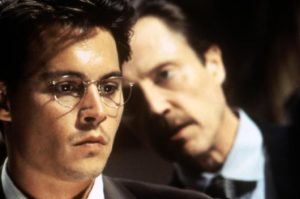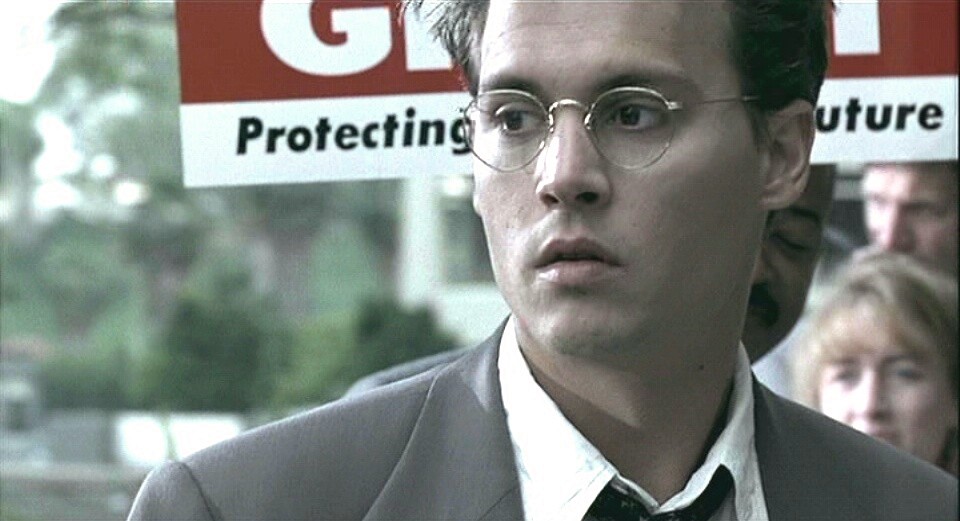If the 1990s’ movie pool had produced nothing else besides suspenseful, action-driven thrillers, it would be remembered as a time that did this one thing very well. Of course, this isn’t the case, but the decade has been remembered as one that produced a plethora of high-class action movies featuring a long list from Hollywood’s talent pool: Nick Nolte, John Travolta, Russell Crowe, Denzel Washington, Julia Roberts, William Forsythe, Christian Slater… the list goes on and on.
What these movies did extremely well was to capture the attention of their audience not necessarily through infallible character depth or plot, but in strong, taught action scenes, camaraderie between allies and even foes, and their commitment to the propelling action of the film, progressing at often break-neck paces, with audiences unable to divert the attention from the screen. There was just something about this time period and these movies that warms my heart.
1995’s “Nick of Time,” is no exception. The movie stars Johnny Depp in the lead role (as Gene Watson), pitting him against impossible odds, long before he learned the stilted utterings of Hunter S. Thompson (“Fear and Loathing in Las Vegas”), or the iconic stuttering of Captain Jack Sparrow (“Pirates of the Caribbean”). Depp is placed in an impossible situation: kill an incumbent Governor at a campaign rally in 90 minutes or his daughter will be killed.
 The action beginning almost as fast as “Nick of Time” starts, Watson, a timid accountant, is propelled into action, doing anything and everything to protect his daughter. He is pitted against a duo of would-be assassins, played by Christopher Walken (“Wedding Crashers”) and Roma Maffia (T.V’s “ER,” “Nip Tuck). They are calculating and precise; especially Walken, who seems to call the shots and know every step Watson takes before he takes it. Time is running out, and as Watson misses opportunity after opportunity to kill his target, it becomes apparent he may be in over his, and, more importantly, his daughter’s head.
The action beginning almost as fast as “Nick of Time” starts, Watson, a timid accountant, is propelled into action, doing anything and everything to protect his daughter. He is pitted against a duo of would-be assassins, played by Christopher Walken (“Wedding Crashers”) and Roma Maffia (T.V’s “ER,” “Nip Tuck). They are calculating and precise; especially Walken, who seems to call the shots and know every step Watson takes before he takes it. Time is running out, and as Watson misses opportunity after opportunity to kill his target, it becomes apparent he may be in over his, and, more importantly, his daughter’s head.
While Watson character may not have a lot of depth, as his heroism in the face of danger is the obvious conclusion to the situation in which he has been placed, he does a good job resonating with the everyman. We like him; we understand his situation. We want him to succeed. Often times the line between reality and fantasy are blurred in this film, and Watson responds accordingly. He is alert and stalwart one minute, frozen and terrified the next.
Other parties in the film do a good job as well. The governor, a woman who is just as baffled to learn of the plot against her life as is Watson (as people in her inner, inner circle are complicit in it), she strikes a good chord with the audience as a sympathetic character. Whether her strength is a product of the movie’s action, or a tactic by the filmmakers to have audiences warm up to the idea of a woman Governor is not so important, but an interesting parallel to modern times, where an African-American is President of the United States, and we move closer and closer to a situation where we could practically have a woman in the White House.
 As the movie reaches its fateful climax, Watson is pushed to an ever-deeper consternation, eliciting the help of whomever he can find. Without giving away the ending, suffice it to say it is wrought with action, drama, and heartfelt emotions throughout.
As the movie reaches its fateful climax, Watson is pushed to an ever-deeper consternation, eliciting the help of whomever he can find. Without giving away the ending, suffice it to say it is wrought with action, drama, and heartfelt emotions throughout.
In the end, “Nick of Time” may not be a perfect movie. Surely better assassination-attempt films exist (Just watch any episode of FOX’s “24”). However, what the movie represents is a time period where action was revered over budgets, a time period where winning casts seemed to magically fall into line, and a time period where movies weren’t afraid to have fun, reel us in, and present us with a reasonable amount of escapism. If you haven’t seen this movie, I would recommend it. You may not believe every minute of it, but you’ll love it just the same.
– by Mark Ziobro


